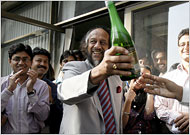随着经济的发展,人类对环境的污染也日益严峻。在交额烂头之时,我们将目光交给那些兢兢业业的专家们。政府间气候变化专门委员会成立于1988年,专家组成员曾于2007年被联合授予诺贝尔和平奖。它最初是由联合国环境保护项目和世界气象组织联合发起组织的,目的是为了定期整合已有的关于气候变化原因与后果的研究结果和学界对这些研究结果的反应。专家组通常会提供大篇的技术报告及相应的简短摘要,用以描述社会发展对于气候变化产生的可能影响。然而,各国政府的“言行不一”让专家组的一些领导人不得不站出来,明确表示他们对于政策制定的意见,科学并不能告诉社会该做些什么,因为现实并不像理论上的那样简单。
Can Climate Panel(专门小组) Have Climate Impact?

I have an article in Tuesday’s Science Times(《科学时报》) assessing next steps for the Intergovernmental Panel on Climate Change(政府气候变化专门委员会). The panel, which shared the Nobel Peace Prize (诺贝尔和平奖)in 2007, was created in 1988 under the United Nations Environment Program and World Meteorological Organization (联合国环境计划署和世界气象局)to aid governments by periodically reviewing the accumulated research on the causes and consequences of climate change and possible responses. But it was proscribed from recommending particular courses of action.
The task of being policy relevant but policy neutral has become ever tougher, it seems. The massive(大量的) reports and shorter summaries(摘要) are certainly relevant to global and national energy policies, describing the possible climatic outcomes of a wide range of societal paths, from business as usual to aggressive emissions curbs. But so far, as the article notes, there’s scant(缺乏) evidence that world leaders, while lauding(赞美) the climate panel and publicly accepting its periodic conclusions, are taking them to heart.
That disconnect(言行不一致) has prompted some leaders of the climate panel, including Rajendra K. Pachauri, its chairman since 2002, to speak out (毫无保留地说出)strongly in favor of certain policy choices, from deep cuts in emissions by developed countries (从降低发达国家的有害物质排放量)to steps taken on energy and climate by President Obama and Congress in the United States.
In an interview, Dr. Pachauri readily acknowledged that he presses for particular actions(明确地承认曾表达过类似的意见), but said he does so as an individual(但是是个人观点). He said this does not present a conflict. “When I quote from the I.P.C.C(专家组的调查报告). I make sure that whatever I say is totally accurate,” he said. “But that doesn’t prevent me from expressing my own views. I do get criticism, but if you stand still you won’t get anywhere.”
Gerbrand Komen, who was the longtime head of the Dutch government delegation at climate-panel plenary meetings(荷兰政府代表团的负责人参加专家组的全体大会) and is a former director of climate research at the Royal Netherlands Meteorological Institute(荷兰皇家气象学院), said that the climate panel is, in essence, presenting mixed messages and assuming mixed roles.
“I like to distinguish people trying to understand the world and people trying to change the world,” Dr. Komen said in an email. “I.P.C.C. (’policy relevant, but not policy prescriptive’(政策相关但不引导政策制定)) is in between. In all three groups [the climate panel's working groups on the science(科学问题组), impacts and adaptive response(气候变化影响和适应性应对组) and mitigation of human-caused warming(人为原因导致气候变暖应对组)] there are people that ignore uncertainty bands, and emphasize extremes, for various reasons: be it curiosity or the wish to influence policy. Modelers sometimes tend to forget that their models are only models.”
Discussions of climate science and policy have seen endless fights over the appropriate role of scientists. Should they limit themselves to laying out the evidence, uncertainties and all, and let society respond however it may? Or should they be as free as any citizen to dive into the policy debate, as James Hansen of NASA and Dr. Pachauri (who is an engineer and economist) have done?
And if you endorse such actions by Dr. Hansen(如果你赞同汉森博士的说法), can you criticize them when the scientist/advocate stakes an entirely different ideological or economic position? In 2007, on the C-Span program “Close Up at the Newseum(聚焦新闻博物馆),” I asked Patrick J. Michaels, a climatologist working with the Cato Institute who unabashedly labels his work “ advocacy science,” just what that phrase means. He offered a defense reaching back to Thomas Jefferson’s encouragement of scientists to be citizens.
In the end, many people in this arena insist, the science frames the discussion, providing the best picture of consequences and opportunities while laying out ranges of risk and uncertainty. In its 21 years, the Intergovernmental Panel on Climate Change(政府气候变化专门委员会) has played a unique role in facilitating just that framing, many panel members and experts on science and policy say.
But in the end, I hear again and again, science doesn’t have a role in telling society what to do. If only things were that simple. Kenneth Caldeira, a climate specialist whom I’ve interviewed about ocean acidification(海洋酸化), geo-engineering(地质工程学), climate tipping points(气候剧变点) and other questions, says there is substantial peril in “describing policy prescriptions as if they’re a scientific conclusion.”
He bases his thinking on some fundamentals of philosophy, as laid out by David Hume long ago. “You can’t get an ought from an is,(你不能仅从事实的描述中推出我们现实中应该做什么)” Dr. Caldeira told me.
Keke View:政府间气候变化专业委员会(IPCC)
IPCC是一个政府间机构,它向UNEP和WMO所有成员国开放。在大约每年一次的委员会全会上,就它的结构、原则、程序和工作计划作出决定,并选举主席和主席团。全会使用六种联合国官方语言。
IPCC设有三个工作组:第一工作组评估气候系统和气候变化的科学问题;第二工作组的工作针对气候变化导致社会经济和自然系统的脆弱性、气候变化的正负两方面后果及其适应方案;第三工作组评估限制温室气体排放和减缓气候变化的方案。另外还设立一个国家温室气体清单专题组。每个工作组(专题组)设两名联合主席,分别来自发展中国家和发达国家,其下设一个技术支持组。












